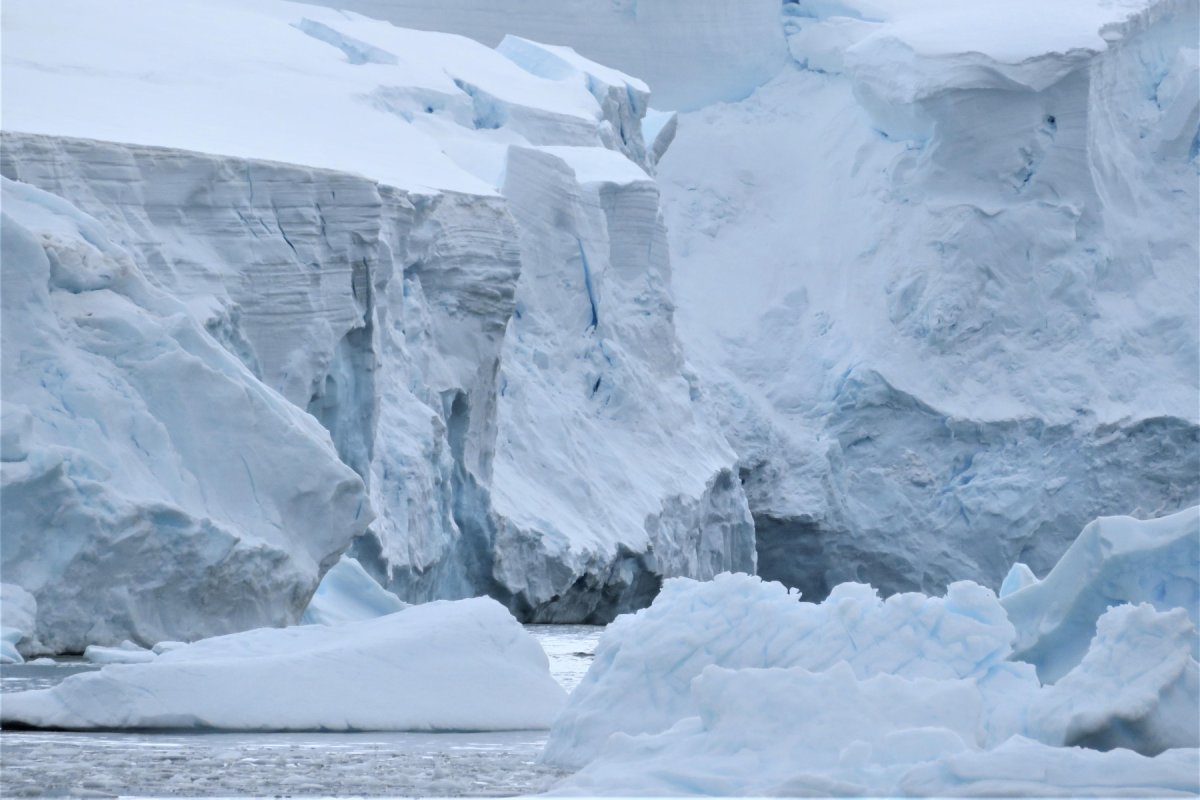A huge Antarctic glacier has suddenly started melting much faster than before after years of little change thanks to warming oceans, researchers have found.
The Cadman Glacier, situated on the Antarctic Peninsula, increased the speed of its retreat by around 94 percent between 2018 and 2019 after nearly 50 years of relatively little change, showing how vulnerable the region is to climate change, a new paper in the journal Nature Communications reveals.
The researchers used satellite observations and oceanographic measurements to look into how the Cadman Glacier changed between 1991 and 2022, finding that the speed at which the glacier was melting was accelerating, increasing by a rate of around 0.5 gigatons (around 200 billion pounds) per year. Between November 2018 and December 2019, the Cadman Glacier’s calving front crept back by 5 miles.
Anna Hogg
“Cadman Glacier is on the west coast of the Antarctic Peninsula, the mountainous spine that points out from the continent toward South America. Since the 1970s, when we started having regular satellite images, the glacier appeared stable with its terminus (where it meets the sea) not changing position significantly,” Benjamin Wallis, a glacier and climate researcher at the University of Leeds and a co-author of the paper, told Newsweek.
“But in 2018 the glacier started accelerating its flow and retreating, shrinking in length by 8 kilometers (5 miles) between 2018 and 2021. Since 2021, the glacier has not shown any signs of readvancing.”
The researchers also found that the retreat of the glacier occurred at the same time as a positive temperature anomaly in the upper ocean, with a 1,300-foot deep channel allowing warm water to reach the Cadman Glacier. Having nearly doubled in its speed of retreat, 2.16 billion tons of ice are now draining from the Cadman Glacier into the ocean each year.
“We were surprised to see the speed at which Cadman went from being an apparently stable glacier to one where we see sudden deterioration and significant ice loss,” Wallis said in a statement.
The retreat of glaciers in Antarctica increasingly destabilizes the Antarctic Ice Sheet, which is the largest single mass of ice on Earth. Until recently, most research had been focused on glacier melt toward the eastern Antarctic Peninsula due to the breakup of the Larsen ice shelves, as the western peninsula had been more stable. This research shows that the western peninsula glaciers, including the Cadman Glacier, are less stable now than they were before.
“Our work points to the warming ocean causing the glacier to accelerate and retreat. This is because the oceans around Antarctica have been warming and the glacier is in contact with these waters where it flows into the ocean and begins to float,” Wallis said. “It was melting from beneath, which we were able to detect using satellite data.
“Outstanding and pioneering work by other glaciologists and oceanographers has shown that ice shelves and glaciers in Antarctica are being eroded by warm ocean water. This paper is an example of how this can lead to sudden and rapid ice loss. There are other glaciers in the same region which might behave in a similar way in the future.”
The researchers stress that while the Cadman Glacier alone melting won’t have much of an impact on sea level rise, it’s symptomatic of the Antarctic ice sheet slowly decaying due to increasing water temperatures. As the Cadman and other glaciers across the peninsula start melting further, this may lead to significant increases in sea level over the next few decades.
“The glacier in this study, Cadman Glacier, is small in Antarctic terms and won’t contribute significantly to sea level rise on its own,” Wallis said. “However, it’s important that we understand how glaciers like this in Antarctica respond to the changing environment so that we can make better projections of future sea level rise.”

Anna Hogg
Michael Meredith, a paper co-author and oceanographer at the British Antarctic Survey, agreed: “We have known for some time that the ocean around Antarctica is heating up rapidly, and that this poses a significant threat to glaciers and the ice sheet, with consequences for sea level rise globally,” he said in the statement.
“What this new research shows is that apparently stable glaciers can switch very rapidly, becoming unstable almost without warning, and then thinning and retreating very strongly. This emphasizes the need for a comprehensive ocean observing network around Antarctica, especially in regions close to glaciers that are especially hard to make measurements.”
Do you have a tip on a science story that Newsweek should be covering? Do you have a question about glacier melt? Let us know via [email protected].
Uncommon Knowledge
Newsweek is committed to challenging conventional wisdom and finding connections in the search for common ground.
Newsweek is committed to challenging conventional wisdom and finding connections in the search for common ground.


